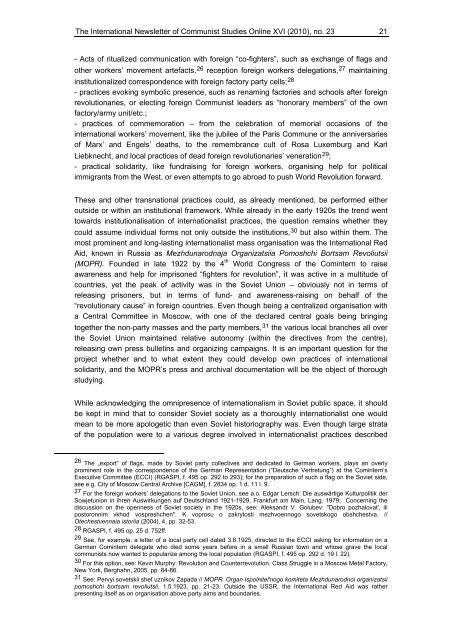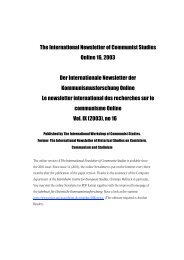VOL. XVI (2010), NO 23 - The International Newsletter of Communist ...
VOL. XVI (2010), NO 23 - The International Newsletter of Communist ...
VOL. XVI (2010), NO 23 - The International Newsletter of Communist ...
Sie wollen auch ein ePaper? Erhöhen Sie die Reichweite Ihrer Titel.
YUMPU macht aus Druck-PDFs automatisch weboptimierte ePaper, die Google liebt.
<strong>The</strong> <strong>International</strong> <strong>Newsletter</strong> <strong>of</strong> <strong>Communist</strong> Studies Online <strong>XVI</strong> (<strong>2010</strong>), no. <strong>23</strong> 21<br />
- Acts <strong>of</strong> ritualized communication with foreign “co-fighters”, such as exchange <strong>of</strong> flags and<br />
other workers’ movement artefacts, 26 reception foreign workers delegations, 27 maintaining<br />
institutionalized correspondence with foreign factory party cells; 28<br />
- practices evoking symbolic presence, such as renaming factories and schools after foreign<br />
revolutionaries, or electing foreign <strong>Communist</strong> leaders as “honorary members” <strong>of</strong> the own<br />
factory/army unit/etc.;<br />
- practices <strong>of</strong> commemoration – from the celebration <strong>of</strong> memorial occasions <strong>of</strong> the<br />
international workers’ movement, like the jubilee <strong>of</strong> the Paris Commune or the anniversaries<br />
<strong>of</strong> Marx’ and Engels’ deaths, to the remembrance cult <strong>of</strong> Rosa Luxemburg and Karl<br />
Liebknecht, and local practices <strong>of</strong> dead foreign revolutionaries’ veneration29 ;<br />
- practical solidarity, like fundraising for foreign workers, organising help for political<br />
immigrants from the West, or even attempts to go abroad to push World Revolution forward.<br />
<strong>The</strong>se and other transnational practices could, as already mentioned, be performed either<br />
outside or within an institutional framework. While already in the early 1920s the trend went<br />
towards institutionalisation <strong>of</strong> internationalist practices, the question remains whether they<br />
could assume individual forms not only outside the institutions, 30 but also within them. <strong>The</strong><br />
most prominent and long-lasting internationalist mass organisation was the <strong>International</strong> Red<br />
Aid, known in Russia as Mezhdunarodnaja Organizatsiia Pomoshchi Bortsam Revoliutsii<br />
(MOPR). Founded in late 1922 by the 4 th World Congress <strong>of</strong> the Comintern to raise<br />
awareness and help for imprisoned “fighters for revolution”, it was active in a multitude <strong>of</strong><br />
countries, yet the peak <strong>of</strong> activity was in the Soviet Union – obviously not in terms <strong>of</strong><br />
releasing prisoners, but in terms <strong>of</strong> fund- and awareness-raising on behalf <strong>of</strong> the<br />
“revolutionary cause” in foreign countries. Even though being a centralized organisation with<br />
a Central Committee in Moscow, with one <strong>of</strong> the declared central goals being bringing<br />
together the non-party masses and the party members, 31 the various local branches all over<br />
the Soviet Union maintained relative autonomy (within the directives from the centre),<br />
releasing own press bulletins and organizing campaigns. It is an important question for the<br />
project whether and to what extent they could develop own practices <strong>of</strong> international<br />
solidarity, and the MOPR’s press and archival documentation will be the object <strong>of</strong> thorough<br />
studying.<br />
While acknowledging the omnipresence <strong>of</strong> internationalism in Soviet public space, it should<br />
be kept in mind that to consider Soviet society as a thoroughly internationalist one would<br />
mean to be more apologetic than even Soviet historiography was. Even though large strata<br />
<strong>of</strong> the population were to a various degree involved in internationalist practices described<br />
26 <strong>The</strong> „export“ <strong>of</strong> flags, made by Soviet party collectives and dedicated to German workers, plays an overly<br />
prominent role in the correspondence <strong>of</strong> the German Representation (“Deutsche Vertretung”) at the Comintern’s<br />
Executive Committee (ECCI) (RGASPI, f. 495 op. 292 to 293); for the preparation <strong>of</strong> such a flag on the Soviet side,<br />
see e.g. City <strong>of</strong> Moscow Central Archive [CAGM], f. 2834 op. 1 d. 11 l. 9.<br />
27 For the foreign workers’ delegations to the Soviet Union, see a.o. Edgar Lersch: Die auswärtige Kulturpolitik der<br />
Sowjetunion in ihren Auswirkungen auf Deutschland 1921-1929, Frankfurt am Main, Lang, 1979; Concerning the<br />
discussion on the openness <strong>of</strong> Soviet society in the 1920s, see: Aleksandr V. Golubev: "Dobro pozhalovat', ili<br />
postoronnim vkhod vospreshchen". K voprosu o zakrytosti mezhvoennogo sovetskogo obshchestva. //<br />
Otechestvennaia istoriia (2004), 4, pp. 32-53.<br />
28 RGASPI, f. 495 op. 25 d. 752ff.<br />
29 See, for example, a letter <strong>of</strong> a local party cell dated 3.8.1925, directed to the ECCI asking for information on a<br />
German Comintern delegate who died some years before in a small Russian town and whose grave the local<br />
communists now wanted to popularize among the local population (RGASPI, f. 495 op. 292 d. 19 l. 22).<br />
30 For this option, see: Kevin Murphy: Revolution and Counterrevolution. Class Struggle in a Moscow Metal Factory,<br />
New York, Berghahn, 2005, pp. 84-86.<br />
31 See: Pervyi sovetskii shef uznikov Zapada // MOPR. Organ Ispolnitel'nogo komiteta Mezhdunarodnoi organizatsii<br />
pomoshchi bortsam revoliutsii, 1.5.19<strong>23</strong>, pp. 21-<strong>23</strong>. Outside the USSR, the <strong>International</strong> Red Aid was rather<br />
presenting itself as on organisation above party aims and boundaries.














